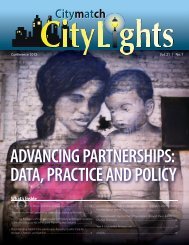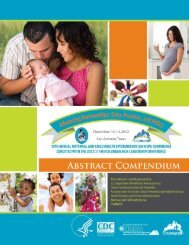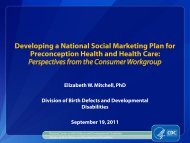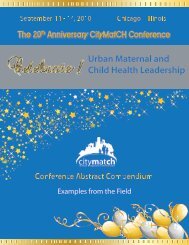Conference Abstract Compendium Examples from the ... - CityMatCH
Conference Abstract Compendium Examples from the ... - CityMatCH
Conference Abstract Compendium Examples from the ... - CityMatCH
Create successful ePaper yourself
Turn your PDF publications into a flip-book with our unique Google optimized e-Paper software.
2009 <strong>CityMatCH</strong> Urban MCH Leadership <strong>Conference</strong>Hartford Pediatric Outreach Project: Coordinating services for hard-to-reach childrenat risk for developmental delaysPRIMARY CONTACT:CO-PRESENTER(S)/AUTHOR(S):Leticia Marulanda, MDSandra Abella, sabella@hartford.gov (Author)Deputy DirectorMarcia Hughes, mhughes@hartford.edu (Author,Hartford Health and Human ServicesPresenter)Department131 Coventry StreetHartford, CT, 06112Phone: (860) 543-8834 Ext. 7033Fax: (860) 722-6334Email: lmarulan@hartford.govCATEGORYChild growth, development, preventive careRacial and ethnic health disparitiesFOCUSProgram Policy FocusISSUENavigating systems of care is difficult and time consuming, especially for families with limited educationand financial resources. The goal of <strong>the</strong> Pediatric Outreach Project was to streng<strong>the</strong>n a comprehensivesystem of early identification and referral for children at risk of development or behavioral problems byenhancing <strong>the</strong> capacity of hard-to-reach families to access services.SETTINGThe Project targeted low-income, under-insured and uninsured families living in <strong>the</strong> North-Endneighborhoods of Hartford. Hartford, CT is a medium-size city of 124,699 people, with all of <strong>the</strong> ills oflarge urban centers; 95.5% of its school population are African American or Hispanic.PROJECTCare coordinators met with families in <strong>the</strong>ir homes for <strong>the</strong> intake assessment, provided information, madereferrals, and followed up to ensure connection with services needed. Families were connected with <strong>the</strong>statewide Ages & Stages (ASQ) Child Development Monitoring Program. Care coordinators were trainedto conduct <strong>the</strong> ASQ screenings with <strong>the</strong> families; if <strong>the</strong> questionnaire revealed a potential problem, <strong>the</strong>yfacilitated assessment and referral services.ACCOMPLISHMENTS/RESULTS51 hard-to-reach families and 99 children participated with 120 referred for services. 22 referrals were forhousehold needs, 20 for day care, 20 for employment or education, 19 for housing; 12 for lead testingand, 8 families were referred to CDI for <strong>the</strong> ASQ program.ASQ questionnaire was administered for 32 children; age of child ranged <strong>from</strong> four to 36 months.Development delays identified in 25% of children in areas of communication, fine motor, problemsolving,and personal/social development. 38% of children enrolled in ASQ Developmental Monitoring105







